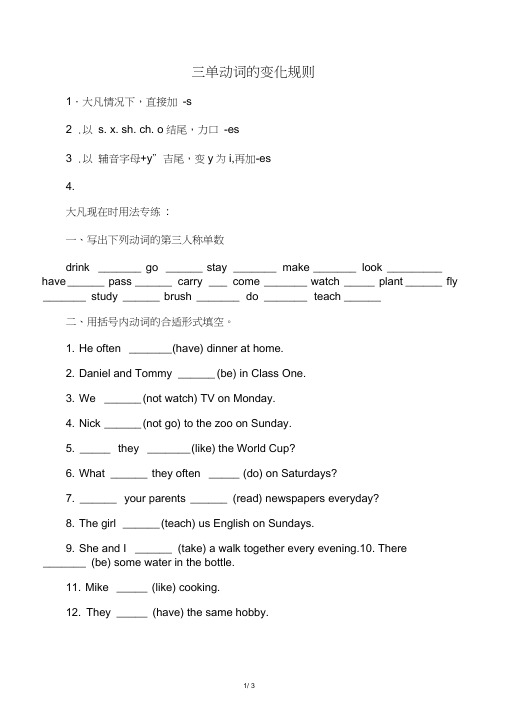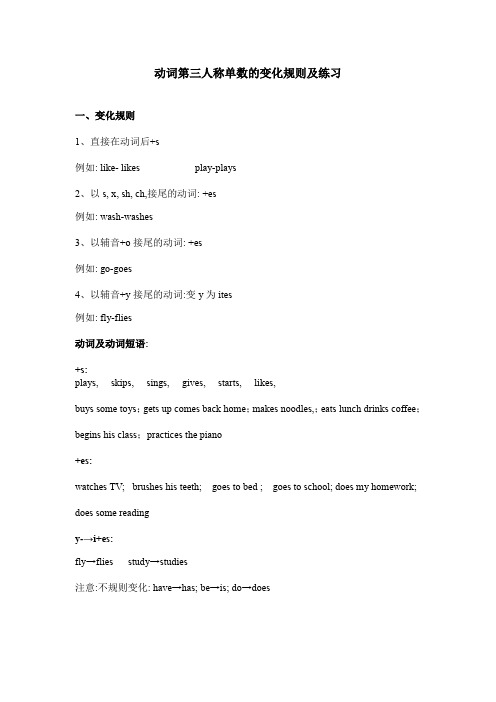动词三单形式变化规则练习
(完整版)三单形式练习题

三单动词的变化规则1.大凡情况下,直接加-s2 .以s. x. sh. ch. o结尾,力口-es3 .以辅音字母+y”吉尾,变y为i,再加-es4.大凡现在时用法专练:一、写出下列动词的第三人称单数drink _______ go ______ stay _______ make _______ look _________ have ______ pass ______ carry ___ come _______ watch _____ plant ______ fly _______ study ______ brush _______ do _______ teach ______二、用括号内动词的合适形式填空。
1. He often _______ (have) dinner at home.2. Daniel and Tommy ______ (be) in Class One.3. We ______ (not watch) TV on Monday.4. Nick ______ (not go) to the zoo on Sunday.5. _____ they _______ (like) the World Cup?6. What ______ they often _____ (do) on Saturdays?7. ______ your parents ______ (read) newspapers everyday?8. The girl ______ (teach) us English on Sundays.9. She and I ______ (take) a walk together every evening.10. There_______ (be) some water in the bottle.11. Mike _____ (like) cooking.12. They _____ (have) the same hobby.13. My aunt ______ (look) after her baby carefully.14. You always ______ (do) your homework well.15. I _____ (be) ill. I ' m staying in bed.16. She ______ (go) to school from Monday to Friday.17. Liu Tao ______ (do) not like PE.18. The child often ______ (watch) TV in the evening.19.SuHaiandSuYang ______ (have)eightlessonsthisterm.20.-Whatday _____ (be)ittoday?It ' sSaturday.三、按照要求改写句子1. Daniel watches TV every evening改为否定句)2.1 do my homework every day.改为大凡疑问句,作否定回答)3. She likes milk .改为大凡疑问句,作肯定回答) ___________________________________________________4. Amy likes playing computer games.改为大凡疑问句,作否定回答)5. We go to school every morning.改为否定句)6. He speaks English very well改为否定句)7. I like taki ng photos in the park.对划线部分提问) __________________________________________________8. John comes from Canada对划线部分提问)9. She is always a good student改为大凡疑问句,作否定回答)10. Simon and Dani el like going skati ng.改为否定句)________________________________________________五、改错(划出错误的地方,将正确的写在横线上)1.IsyourbrotherspeakEnglish? _________________2. Doeshelikesgoingfishing? ________________3. Helikesplaygamesafterclass. ________________4. Mr.WuteachsusEnglish. _________________5.Shedon ' td o h e r h o m ewo r ko n S u n d a y s . _______。
动词第三人称单数的变化规则及练习

动词第三人称单数的变化规则及练习一、变化规则1、直接在动词后+s例如:like- likes play-plays2、以s,x,sh,ch,接尾的动词:+es例如:wash-washes3、以辅音+o接尾的动词:+es例如:go-goes4、以辅音+y接尾的动词:变y为ites例如:fly-flies动词及动词短语:+s:plays,skips, sings,gives,starts,likes,buys some toys;gets up comes back home;makes noodles,;eats lunch drinks coffee;begins his class;practices the piano+es:watches TV; brushes his teeth; goes to bed ; goes to school; does my homework; does some readingy-→i+es:fly→flies study→studies注意:不规则变化:have→has; be→is; do→does一、写出下列动词的第三人称单数drink go stay makelook have pass carrycome watch plant fly二、请看下面两组句子,注意区分他们的共同点和不同点。
I go to school every day.I don't go to school every day.He goes to school every day.He doesn't go to school every day.Do you go to school every day?Yes,I do.(No,I don't)Does he go to school every day?Yes,he does.(No,he doesn't)注:1)第三人称单数用了does后面就不用动词的S形式了.而用动词原形。
完整版)三单形式练习题

完整版)三单形式练习题三单动词的变化规则一般情况下,动词直接加-s。
以s。
x。
sh。
ch。
o结尾的动词,加-es。
以辅音字母+y结尾的动词,变y为i,再加-es。
一般现在时用法专练:1.写出下列动词的第三人称单数drink drinks go goes stay stays make XXXlook looks have has pass passes carry carriesXXXXXX XXX2.用括号内动词的适当形式填空。
1.He often has (have) dinner at home.2.Daniel and Tommy are (be) in Class One.3.We do not watch (not watch) TV on Monday.4.Nick does not go (not go) to the zoo on Sunday.5.Do they like (like) the World Cup?6.What do they often do (do) on Saturdays?7.Do your parents read (read) newspapers every day?8.XXX (teach) us English on Sundays.9.She and I take (take) a walk XXX.10.There is (be) some water in the bottle.11.XXX XXX (like) cooking.12.They have (have) the same hobby.13.My aunt looks after (look after) her baby carefully.14.You always do (do) your homework well.1.I am XXX.2.XXX Friday.3.Liu Tao does not enjoy PE.4.XXX child XXX.5.Su Hai and Su Yang have eight lessons this term.6.Today is Saturday.1.Daniel does not watch TV every evening.2.Do you do your homework every day。
动词第三人称单数的变化规则讲解及习题练习(附答案)

动词第三人称单数的变化规则讲解及习题练习(附答案)1. 大部分单词可以直接在动词后: +s例:like -- like splay -- play swork--work sread--read swrite--write s发音规则:所加的“s”在清辅音后,发【s】,works在浊辅音及元音后,发【z】,plays在d 后与s 一起发【dz】,reads在t 后与s 一起发【ts】,writes2. 以s, x, sh, ch, 结尾的动词: +es例:watch -- watch esbrush-- brush eswash--wash es发音规则:词尾加的“es”,发【iz】3. 以辅音+o 结尾的动词: +es例:go -- go esdo -- do es发音规则:词尾加的“es”,发【z】,does4. 以辅音+y 结尾的动词: 变y 为i+es例:fly -- fl iesstudy -- stud iescarry--carr ies发音规则:词尾加的“es”,发【iz】,carries5. 不规则变化:例:have -- hasbe 动词的单三形式是:is练习题1. 写出下列动词第三人称单数。
drink ________ go _______stay ________ make _______look ________have_______pass_______ carry ________come_______ watch______plan_______ fly ________study_______ brush________do_________ teach_______2. 用所给单词的适当形式填空。
(1) He ______ (go) to school by bus every morning.(2) Jim _______ (have) many toys.(3) Lucy ______ (study) very hard.She ______ (be) never late for school.(4) Ken _______ (like) his father very much.答案:1.drinks goes stays makes looks has passes carries comes watches plans flies studies brushes does teaches2. (1) goes (2) has (3) studies is (4) likes。
动词过去式的变化_动词三人称单数练习_动词ing练习

动词的第三人称单数的单数及发音规则:1.一般直接在动词后加-s,-s在清辅音后读/s/,在浊辅音或元音后读/z/, ds 读/dz/, ts读/ts 如help -helps/s/ know -knows/z/ get -gets/s/ read -reads/z/2.以字母s, x, ch, sh或有些以o 结尾的动词加-es,-es 读/iz/, 如guess -guesses fix -fixes teach -teaches wash -washes注意:go goes/z/ do does /z/3.辅音字母+y结尾的动词,先变y为i,再加-es,-ies读/iz/carry -carries fly -flies study -studies注意:在play---plays,say----says中,字母y前为元音字母,第三人称单数形式直接在动词后加-s4.be动词的第三人称单数分别为am, is, are, have则为has注意:以不发音字母“e”结尾的开音节词,如果尾音是/s/,/z/,加-s后,字母”e”发音,与所加-s一起读作/iz/,如close closes/iz/动词的ing变化规则:1.一般情况直接加ing,如look—looking go---going visit---visiting2.以不发音的e结尾的,去e再加ing,如come---coming make---making write---writing3.以重读闭音节结尾并且只有一个辅音字母的,双写该辅音字母,再加ing,如run---running stop---stopping get---getting swim---swimming begin---beginning4.以辅音字母加y结尾的,直接加ing,如study---studying carry---carrying fly---flying cry---crying5.以ie结尾的重度开音节动词,先变ie为y,再加ing,如die---dying tie---tying lie---lying动词的过去式变化规则:1.规则变化(1)一般直接在动词后加ed,-ed在清辅音后读/t/, 在浊辅音及元音后读/d,/-ed在/t//d/后读/id/,如call---called open---opened look---looked want---wanted /id/ need---needed /id/(2)以不发音的“e”结尾的,直接加-d ,如live---lived move---moved hope---hoped(3)以辅音字母加y结尾的动词,先变y为i,再加-ed,(注意:如果是元音字母加y结尾的,还是直接加-ed,如,play---played,enjoy---enjoyed)如study---studied cry---cried try---tried(4)以一个辅音字母结尾的重读闭音节动词,双写最后一个辅音字母,再加-ed,如plan---planned fit---fitted stop---stopped2.不规则变化(要特俗记忆),以下是一些常见的动词的过去式am,is-was are-were, do-did, see-saw, say-said, give-gave, get-got,另附清辅音与浊辅音:清辅音:[p] [t] [k] [f] [s] [θ] [∫] [ts] [t∫] [tr] [h]浊辅音:[b] [d] [g] [v] [z] [δ] [з] [dz] [dз] [dr] [r]音节分为开音节和闭音节1.开音节又分为相对开音节和绝对开音节(1)相对开音节:“以一个元音字母+一个辅音字母(r除外)+不发音的e”结尾的叫相对开音节。
第三人称单数及动词第三人称单数形式变化规则(附练习及答案)

第三人称单数及动词第三人称单数形式变化规则Ⅰ. 第三人称单数主语归纳在一般现在时中,当主语是第三人称单数时,谓语动词要用第三人称单数形式,即常在动词原形后加-s或-es。
现将第三人称单数主语归纳总结如下:Ⅱ. 动词第三人称单数形式变化规则练习及答案一、写出下列动词的第三人称单数。
drink _______ go _______ stay ________ make ________ pass _______ carry_______ come ________ watch _______ fly ________ study_______ brush _______ teach _______ wash_______ guess______ play _______ finish _______二、用括号内动词的适当形式填空。
1. He often ________ (have) dinner at home.2. We _______ (not watch) TV on Monday.3. Nick _______ (not go) to the zoo on Sunday.4. ______ they ________ (like) the World Cup?5. What _______they often _______ (do) on Saturdays?6. _______ your parents _______ (read) newspapers every day?7. The girl _______ (teach) us English on Sundays.8. She and I ________ (take) a walk together every evening.9. There ________ (be) some water in the bottle.10. My aunt _______ (look) after her baby carefully.11. The child often _______ (watch) TV in the evening.12. Su Hai and Su Yang _______ (have) eight lessons this term.答案:一、写出下列动词的第三人称单数。
(完整版)动词单三变化规律及练习题(五年级)
动词第三人称单数词尾变化及读音动词第三人称单数词尾变化有三种形式。
(1)一般动词在词尾加 -s,-s 在清辅音后读/ s/,在浊辅音或元音后读/ z/ds 读/ dz/, ts 读/ ts/。
如:help→helps/helps/, know→knows/n uz/, get→gets/gets/,read→reads/ri dz/(2)以字母 s,x,ch,sh 或有些以 o 结尾的动词加 -es,-es 读/ iz/。
如:guess→guesses/'siz/, fix →fixes/ 'fiksiz /, teach→ teaches/'ti t iz/, wash→washes/'w iz/注意: go→goes/uz/, do→does/d z/(3)以辅音字母 +y 结尾的动词,先变y 为 i ,再加 -es,-ies 读/ iz/。
如:carry→carries/'k riz/, fly → flies/flaiz /注:在 play→plays/pleiz/, say→says/sez/中,字母 y 前为元音字母,第三人称单数形式直接在动词后边加-s。
(4)特别词例外。
如:be→is,have→has以不发音字母“ e”结尾的开音节词,假如尾音是 [s],[z] 时,加“ s”后字母“ e”发音,与所加“ s”,一同读做 [iz] 。
如:close-closes [iz]一般此刻时练习(一)一、用词的适合形式填空time_________ his father_________(do) the work?2.He _________(get) up at five o’ clock.3.__________ you _________(brush) your teeth every morning?4.What ________ ( do ) he usually ________( do ) after school?5.Tom ________ ( study ) English, Chinese, Maths, Science and Art at school.6. Kitty sometimes __________(go) to the park with his sister.7.At eight at night, she __________( watch ) TV with her parents.8. ________ Mike________( read ) English every day?9.How many lessons________ your classmates______( have ) on Monday?10.We often___________ ( play ) football in the playground.二、选择( ) 1. _____ you have a book?A. DoB. AreC. IsD. Have( )2. They _________ on a farm.A. workingB. is workC. workD. is worked( ) 3. Does Peter like to watch TV?__________.A. Yes, he likeB. No, he doesn’tC.Yes, he’ d likeD. No, he likes ( )4. She doesn’ t __________ her homework in the afternoon.A. doingB. to doC. doesD. do( )5. How ____________ Mr. Brown ___________ to America?A. do,goB. is,goC. does,goD. does,goes( )6. Where’ s my camera? I____________ it.A. am not findingB. am not seeingC. can ’ t findD. can ’ t look at ( )7. How ___________ he go to work?He ___________ to work by bike.A. does ;goB. do;goesC. do ;goD. does;goes( )8. ______ you usually late for school?No, _____________.A. Do ; I amB. Does ;notC. Are ; I ’ m notD. Are ; I aren ’t ( )9. _____ she _____ home at six every day?A. Is , leaveB. Does , leaveC. Is , leavesD. Does , left( )10. Mr. Yang ____________ English this term.A. teaches ourB. teaches usC. teachs usD. teach our一般此刻时练习(二)一、单项选择题1. Jenny ____ in an office. Her parents ____in a hospital.A. work worksB. works workC. work are workingD. is working work2. One of the boys_____ a black hat.A. haveB. there isC. there areD. has3. We will go shopping if it____ tomorrow.A. don't rainB. didn't rainC. doesn't rainD. isn't rain4. He said the sun ____in the east and ____in the west.A. rose; setB. rises; setsC. rises; setD. rise; sets5. Wang Mei ____ music and often ____ to music.A. like; listenB. likes; listensC. like; are listeningD. liking; listen6. Jenny____ English every evening.A. has studyB. studiesC. studyD. studied7. _____Mike from Japan?A. AreB. DoC. Does8. _____you come from Japan?A. AreB. DoC. Does9.What language do you_______?A. sayB. talkC. tellD. speak10.The elephant likes______her friends and _____grass.A. play with; eatB. play with; eatsC. to play with; eatD. to play with; eats二、所给动词的正确形式填空1.I can take Li Ming there when he _____(come) to visit.2._____your sister_____(know)English?3.Her home____ (be) away from her school.4.The pot_____(not look) like yours very much.5.Where _____you____(have)lunch every day?6.Who_____(want)to go swimming?7.______she_____(do) the housework every day?8.Jenny and Danny usually______(play) games in the afternoon .9.______you ______(like) English?10.What______his father_____(do) ?。
动词三单形式概念规则及练习题
改为一般疑问句
1. I like the schoolbag. 2. He likes fruit. 3. They eat bread. 4. Helen eats chicken. 5. My father plays soccer. 6. I want to watch TV. 7. She wants to have lunch. 8. Eric goes to school. 9. We think about food. 10.Paul helps his classmates.
幻灯片 6
play- plays ask- asks find- finds think- thinks like- likes
fix- fixes miss- misses
watch- watches teach- teaches wash- washes finish- finishes go- goes do- does play- plays
She has a baseball.
Does she have a pen?
She goes to school
助动词:
1. 助动词有哪些? do . does
2. 助动词有什么用?
在有实意动词的句子中,
帮助构成疑问句 :助动词do/does提前 和否定句 : do not /does not
I have a baseball.
改为否定句
1. I like the schoolbag. 2. He likes fruit. 3. They eat bread. 4. Helen eats chicken. 5. My father plays soccer. 6. I want to watch TV. 7. She wants to have lunch. 8. Eric goes to school. 9. We think about food. 10.Paul helps his classmates.
动词第三人称单数的变化规则及练习
动词第三人称单数的变化规则一、使用情况:在一般现在时中,当主语是第三人称单数时,谓语动词要用第三人称单数形式,即常在动词原形后加-s或-es。
(标志词usually often always sometimes every等)二、变化规则1、直接在动词后+s 例如:like- likes play-plays2、以s, x, sh, ch, 接尾的动词:直接在动词后+es 例如:wash-washes3、以辅音+o接尾的动词:直接在动词后+es 例如:go-goes4、以辅音字母+y接尾的动词:把y为变为i,再+es 例如:fly-flies 以元音字母+y接尾的动词后+s例如:play-plays5、除上述规律外,还应注意下面三点:1)动词have ,遇到主语是第三人称单数时,have变成has;动词be 的第三人称单数形式是is。
2)含有动词第三人称单数形式的句子变否定句时,要用doesn't + 动词原形,如:He goes to school at six in the morning. (变否定句)→He doesn't go to school at six in the morning.3)对含有动词第三人称单数形式的句子提问时,要用助动词does如:She goes home at five every day. (对划线部分提问)→When / What time does she go注意:不规则变化:have-----has,be-------is,do-----does动词第三人称单数的变化规则一、使用情况:在一般现在时中,当主语是第三人称单数时,谓语动词要用第三人称单数形式,即常在动词原形后加-s或-es。
(标志词usually often always sometimes never every等)二、变化规则1、直接在动词后+s 例如:like- likes play-plays2、以s, x, sh, ch, 接尾的动词:直接在动词后+es 例如:wash-washes3、以辅音+o接尾的动词:+es 例如:go-goes4、以辅音字母+y接尾的动词:把y变为i,再+es 例如:fly-flies 以元音字母+y接尾的动词后+s例如:play-plays5、除上述规律外,还应注意下面三点:1)动词have ,遇到主语是第三人称单数时,have变成has;动词be 的第三人称单数形式是is。
动词三单变化规则与练习
动词三单变化规则与练习哪些主语是第三人称单数?下面是一些例子:第一类是人称代词he,she,it,例如:XXX。
他喜欢看电视。
She has XXX at XXX。
她十二点吃午餐。
It looks like a cat。
它看起来像只猫。
第二类是单个人名、地名或称呼作主语,是第三人称单数,例如:XXX XXX看起来像她的母亲。
Beijing is in China。
北京在中国。
Uncle Wang often XXX cakes。
XXX经常做蛋糕。
Bob does his homework every day。
鲍勃每天都做家庭作业。
第三类是单数名词或“this/that/the+单数可数名词”作主语时,是第三人称单数,例如:This book is yours。
这本书是你的。
That car is red。
那辆小汽车是红色的。
The cat is Lucy's。
这只猫是XXX的。
第四类是指示代词this,that作主语时,是第三人称单数,例如:This is a pen。
这是一支钢笔。
That is an XXX。
那是一块橡皮擦。
动词第三人称单数的变化规则如下:1.直接在动词后+s,例如like-likes,play-plays。
2.以s,x,sh,ch接尾的动词+es,例如wash-washes。
3.以辅音+o接尾的动词,+es,例如go-goes。
4.以辅音+y接尾的动词,变y为i+es,例如fly-flies,study-studies。
注意:动词三单特殊形式,例如go-goes,do-does,have-has,be-is。
练题:(三单形式)1.works2.watches3.cleans4.writes5.XXX6.washes7.has8.reads9.goes10.does11.flies12.studies13.XXX.(注意主语是第三人称单数,应该用watches)。
I watch TV.(注意主语是第一人称单数,应该用watch)。
- 1、下载文档前请自行甄别文档内容的完整性,平台不提供额外的编辑、内容补充、找答案等附加服务。
- 2、"仅部分预览"的文档,不可在线预览部分如存在完整性等问题,可反馈申请退款(可完整预览的文档不适用该条件!)。
- 3、如文档侵犯您的权益,请联系客服反馈,我们会尽快为您处理(人工客服工作时间:9:00-18:30)。
一般现在时
动词三单形式变化
1.一般直接在动词后加s ;play--plays
2.以s/x/o/sh/ch 结尾的动词,直接加es ;watch--watches
3.以辅音加y 结尾的动词,变y 为i 再加es ;study--studies
4.特殊变化,have--has
(注意:只有当主语是she/he/it/人名单数/名词单数时,动词才要变化
“does ” 一出现,动词就还原。
)
1.写出下列动词的三单形式
jump _______ throw _______ kick _______ catch
_______
wash _______ go _______ study _______ busy _______ hop _______ run _______ read _______ have_______
2.请在括号内选择正确的词。
Tom (like/likes) roller skating,but I (like/likes)watching TV.
My father (read/reads)books,and I (do/does)my homework. Jack ’s classmates(play/plays)basketball every afternoon.
④Lily ’s sister(draw/draws)picture every day.
⑤Father(buy/buys)me a gift for my birthday.
⑥Jack and I(bounce/bounces)ball every Sunday morning.
3.请用括号内动词的正确形式填空
She_______(cook)everyday ,but doesn ’t_______(wash) everyday.
练 习
四大原则
He______(do) his homework at 5 ,but I ______(do) my homework at 6:30.
Bob ______(have) lunch at 12:00,but we ______(have) lunch at 12:30.
Lily and Lucy_________(go) to school every week.
The cat doesn’t ________(eat) fish everyday.
The dogs_________(play)on the floor everyday.
.。
